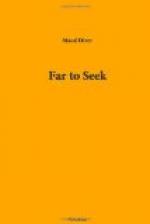“I know the journey in June will be a nightmare. And you won’t like leaving Indian friends or Miss Arden. But think—here he is alone, wanting what only you can give him. And the bangle I sent you That Day—if you’ve kept it—gives me the right to say ‘Come—quickly.’ It may be a wrench. But I promise you won’t regret it. Wire, if you can.
“Always
your loving
TARA.”
By the time he had finished reading that so characteristic and endearing letter his plans were cut and dried. Her irresistible appeal—and the no less irresistible urge within him—left no room for the deliberations of his sensitive complex nature. It flung open all the floodgates of memory; set every nerve aching for Home—and Tara, late discovered; but not too late, he passionately prayed....
The nightmare journey had no terrors for him now. In every sense he was ‘hers to command.’
He drew out his old, old letter-case—her gift—and opened it. There lay the bracelet, folded inside her quaint, childish note; the ‘ribbin’ from her ‘petticote’ and the gleaming strands of her hair. The sight of it brought tears of which he felt not the least ashamed.
It also brought a vision of himself standing before his mother, demurring at possible obligations involved in their ‘game of play.’ And across the years came back to him her very words, her very look and tone: ’Remember, Roy, it is for always. If she shall ask from you any service, you must not refuse—ever.... By keeping the bracelet you are bound ...’
Wire? Of course he would.
Before the day was out his message was speeding to
her: “Engagement off.
Coming first possible boat. Yours to command—ROY.”
FOOTNOTES:
[Footnote 40: English mail.]
CHAPTER III.
“Did you not know that people
hide their love,
Like a flower that seems too precious to be
picked?”
—WU-TI.
Sanctuary—at last! The garden of his dreams—of the world before the deluge—in the quiet—coloured end of a July evening; the garden vitally inwoven with his fate—since it was responsible for the coming of Joe Bradley and his ‘beaky mother.’
Such gardens bear more than trees and flowers and fruit. Human lives and characters are growth of their soil. With the wholesale demolishing of boundaries and hedges, their influence may wane; and it is an influence—like the unobtrusive influence of the gentleman—that human nature, especially English nature, can ill afford to fling away.
Roy, poet and fighter—with the lure of the desert and the horizon in his blood—knew himself, also, for a spiritual product of this particular garden—of the vast lawn (not quite so vast as he remembered), the rose-beds and the beeches in the full glory of their incomparable leafage; all steeped in the delicate clarity of rain-washed air—the very aura of England, as dust was the aura of Jaipur.




